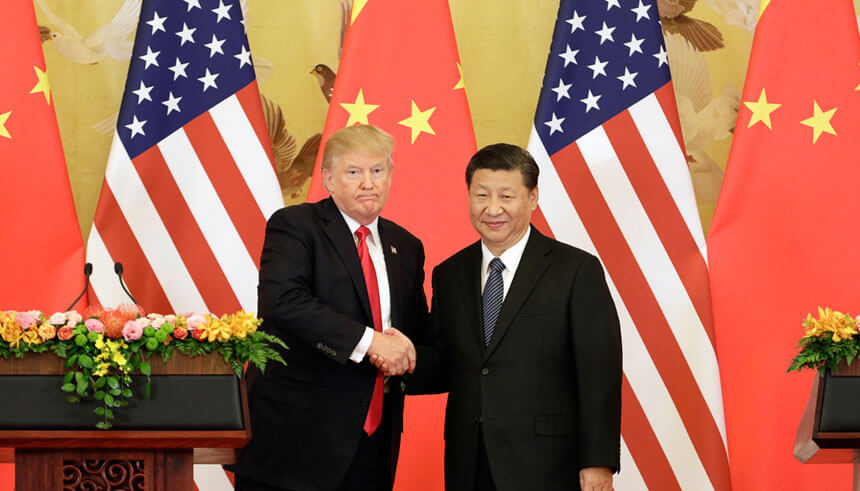US-Asia Business
US-China Market Watch: Trade Talks, Alipay Joins Walgreens, China Box Office
By Angela Bao

Your monthly roundup of the latest US-China business and industry news.
Trump delays China tariffs
President Trump and China’s President Xi Jinping are planning a summit in March at Trump’s Mar-a-Lago resort in Florida, where Trump hopes they will finalize a trade deal. After “productive” trade talks in Washington D.C. between U.S. and Chinese delegations, the United States Trade Representative’s office has announced that they are moving to suspend the tariff increase “until further notice.” The announcement comes on the heels of Trump saying he was going to delay the tariffs, originally scheduled for March 1. Both sides said that there had been good progress made on issues such as intellectual property, technology transfers, agriculture and currency.
Some of the Chinese delegation remained in Washington D.C. after Chinese Vice Premier Liu He left for Beijing. The New York Times reports that a U.S. trade delegation is also expected to travel to Beijing before Xi’s trip to Mar-a-Lago, to continue the negotiations.
Meanwhile, the American Chamber of Commerce has reported that 59 percent of foreign businesses feel that intellectual property protection has improved in China, likely as a response to the United States’ trade demands. However, the report also stated that almost half of responders would invest in China if IP protection was stronger and that overall business optimism had decreased.
Walgreens now accepts Alipay at 3,000 U.S. stores
Alipay, Alibaba’s mobile payments platform that boasts over 900 million global users, is now accepted at 3,000 Walgreens stores in the United States, with hopes to expand to a total of 7,000 stores by April. Walgreens is now the largest U.S. drugstore chain to accept Alipay.
The decision aims to make purchasing goods easier for Chinese tourists traveling abroad, since more than two-thirds of Chinese tourists use mobile payments when traveling. Chinese tourists often prefer Alipay because some first-time travelers may not have international credit cards, according to TechCrunch. Alipay also generally offers lower foreign transaction fees than credit cards.
The Walgreens stores that currently accept Alipay are concentrated in high-tourism cities like New York, San Francisco and Las Vegas. Walgreens products are also available in China on Alibaba’s e-commerce site, Tmall.
China breaks record for biggest box office month
Propelled by domestic science-fiction blockbuster “The Wandering Earth” and the following release of Hollywood’s “Alita: Battle Angel,” February surpassed $1.6 billion in box office ticket sales and became China’s biggest box office month of all time. “The Wandering Earth,” based off of award-winning sci-fi author Liu Cixin’s novella of the same name, has so far taken in over $640 million to become China’s second-highest grossing movie after 2017’s “Wolf Warrior 2.” “Alita,” which disappointed at the U.S. box office, became 20th Century Fox’s biggest China debut yet by taking in $62 million its first weekend.
Many people see “The Wandering Earth” as China’s first foray into a mainstream, high-production film. Netflix acquired the rights to stream the movie in 190 countries (except for China, where Netflix isn’t available) and will translate it into 28 languages.
Mastercard tries to enter China
American credit card company Mastercard is once again trying to enter the Chinese market, this time by partnering with a Chinese firm “close to the regulator in charge of approving credit card businesses,” reports The Wall Street Journal. Mastercard plans to set up a joint venture with online payments clearing house NetsUnion Clearing Corp. (also known as Wanglian) and then refile its application with the People’s Bank of China.
Mastercard has previously filed an application with different Chinese partners, which has been pending for a year. In November of last year, its competitor American Express became the first U.S. credit card company to build its own payments network in China.
Trump pushes U.S. artificial intelligence research
President Trump signed an executive order to promote the research and development of American artificial intelligence technologies in response to China’s push to become a global leader in the industry. Titled the “American AI Initiative,” the order proposes to redirect federal funds toward AI research, make federal data more available to AI researchers, establish American-led international standards in AI, and train workers in using the technology. However, the initiative doesn’t include any new funding for AI research and development, nor does it establish a timeline for its goals.
Sign up for the Reach Further Newsletter
We’ll keep you in the know about the latest US-Asia business news and trends.
Suscríbase al boletín Reach Further
Lo mantendremos informado sobre las últimas noticias y tendencias comerciales entre Estados Unidos y China.

